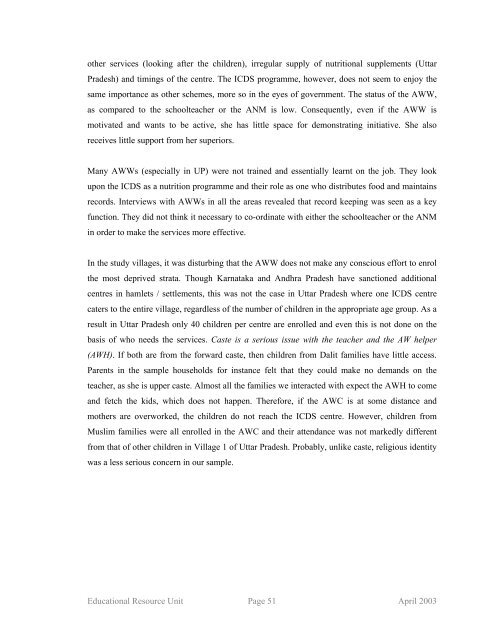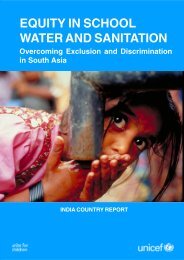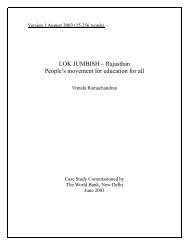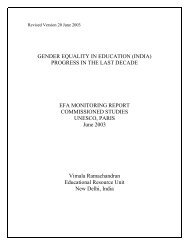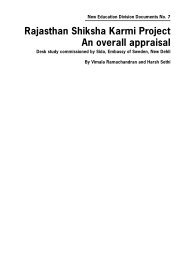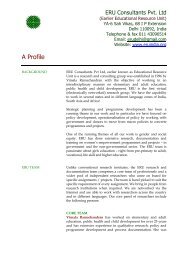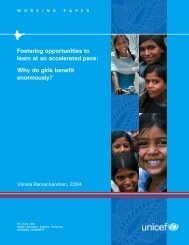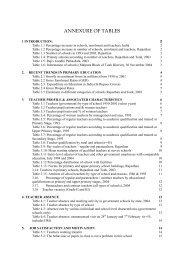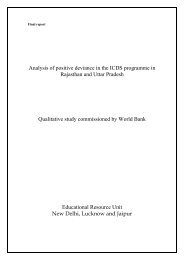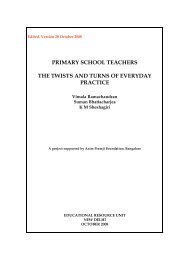Snakes and Ladders - ERU Consultants Pvt. Ltd.
Snakes and Ladders - ERU Consultants Pvt. Ltd.
Snakes and Ladders - ERU Consultants Pvt. Ltd.
You also want an ePaper? Increase the reach of your titles
YUMPU automatically turns print PDFs into web optimized ePapers that Google loves.
other services (looking after the children), irregular supply of nutritional supplements (Uttar<br />
Pradesh) <strong>and</strong> timings of the centre. The ICDS programme, however, does not seem to enjoy the<br />
same importance as other schemes, more so in the eyes of government. The status of the AWW,<br />
as compared to the schoolteacher or the ANM is low. Consequently, even if the AWW is<br />
motivated <strong>and</strong> wants to be active, she has little space for demonstrating initiative. She also<br />
receives little support from her superiors.<br />
Many AWWs (especially in UP) were not trained <strong>and</strong> essentially learnt on the job. They look<br />
upon the ICDS as a nutrition programme <strong>and</strong> their role as one who distributes food <strong>and</strong> maintains<br />
records. Interviews with AWWs in all the areas revealed that record keeping was seen as a key<br />
function. They did not think it necessary to co-ordinate with either the schoolteacher or the ANM<br />
in order to make the services more effective.<br />
In the study villages, it was disturbing that the AWW does not make any conscious effort to enrol<br />
the most deprived strata. Though Karnataka <strong>and</strong> Andhra Pradesh have sanctioned additional<br />
centres in hamlets / settlements, this was not the case in Uttar Pradesh where one ICDS centre<br />
caters to the entire village, regardless of the number of children in the appropriate age group. As a<br />
result in Uttar Pradesh only 40 children per centre are enrolled <strong>and</strong> even this is not done on the<br />
basis of who needs the services. Caste is a serious issue with the teacher <strong>and</strong> the AW helper<br />
(AWH). If both are from the forward caste, then children from Dalit families have little access.<br />
Parents in the sample households for instance felt that they could make no dem<strong>and</strong>s on the<br />
teacher, as she is upper caste. Almost all the families we interacted with expect the AWH to come<br />
<strong>and</strong> fetch the kids, which does not happen. Therefore, if the AWC is at some distance <strong>and</strong><br />
mothers are overworked, the children do not reach the ICDS centre. However, children from<br />
Muslim families were all enrolled in the AWC <strong>and</strong> their attendance was not markedly different<br />
from that of other children in Village 1 of Uttar Pradesh. Probably, unlike caste, religious identity<br />
was a less serious concern in our sample.<br />
Educational Resource Unit Page 51 April 2003


